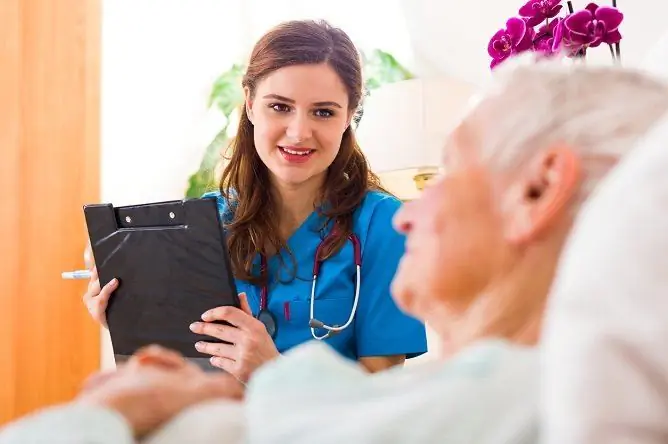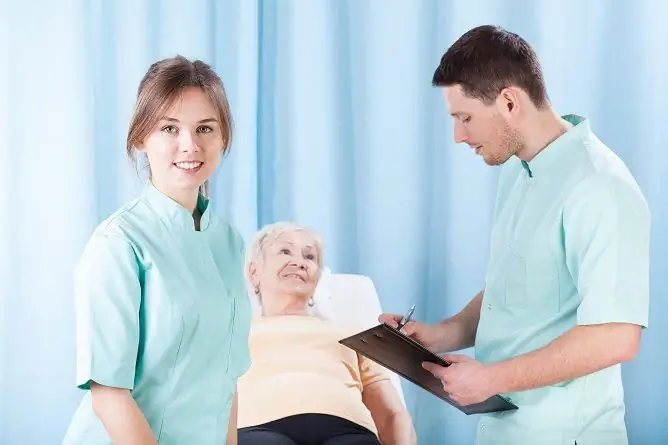- Author Rachel Wainwright wainwright@abchealthonline.com.
- Public 2024-01-15 19:51.
- Last modified 2025-11-02 20:14.
Rehabilitation centers after stroke for bedridden patients, as well as for patients with motor and speech disorders
The content of the article:
- Principles of post-stroke rehabilitation
- Benefits of getting help at a stroke rehabilitation center
- How is rehabilitation going
- Rehabilitation centers after a stroke in the CIS countries
- Video
Rehabilitation centers after a stroke provide for the management of patients until the maximum resumption of body functions. The prognosis depends not only on the area of the brain affected by the pathological process and its extent, but also on the treatment received and the accurate and regular implementation of measures aimed at restoring brain functions. The best results are observed when rehabilitation is started as early as possible.

Rehabilitation activities after a stroke should be started as early as possible
Stroke is an acute violation of cerebral circulation, characterized by cerebral and / or focal symptoms, which can lead to damage to brain structures, which cause dysfunctions of the body of varying severity, up to life-threatening. Stroke is one of the main causes of disability in patients (about 70% of the total number of survivors). 20-30% of people who have suffered acute cerebrovascular accident require constant care. These numbers may be lower if rehabilitation is started early and carried out correctly and methodically.
Principles of post-stroke rehabilitation
Post-stroke rehabilitation involves a set of measures aimed at restoring lost functions.
Rehabilitation measures should be started as soon as possible, from the first days after the stroke, if the patient's condition allows it. Rehabilitation activities should begin while the patient is still in the neurological unit and then continue in the stroke rehabilitation center (bedridden patients) or the hospital rehabilitation unit. In carrying out rehabilitation measures, it is important to strictly adhere to the program, to carry out procedures and classes regularly, without omissions, to gradually move from simple to complex.
Of paramount importance is the active participation in the rehabilitation process of the patient who has suffered a stroke, as well as his relatives.
So, the basic rules of post-stroke rehabilitation:
- start as early as possible;
- strict adherence to the developed program;
- a gradual increase in load.
It is recommended to consult with the attending physician who can provide and comment on the rating of recovery centers, and recommend the best option.
Benefits of getting help at a stroke rehabilitation center
After suffering a stroke, the patient needs almost constant care, but not every medical institution has the ability to provide it. The rehabilitation process is often lengthy and difficult, and it is not always possible to organize it at home, at least at first, especially in bedridden patients. In order not to miss the opportunities that are maximum in the first days, and to facilitate the task for the patient's relatives and himself, it is recommended that stroke patients be placed in specialized rehabilitation centers for recovery after a stroke, where they can receive the entire amount of necessary assistance under the supervision of qualified specialists.
How is rehabilitation going
An individual rehabilitation program is developed for each patient, taking into account the nature of his disease, disorders caused by stroke, the general condition of the body and a number of other factors. Basic methods:
- drug therapy (as needed);
- kinesiotherapy, exercise therapy;
- massage;
- physiotherapy;
- restoration of articulation;
- balneotherapy;
- psychological support.
Kinesotherapy - treatment with passive and active movements, aimed at the fullest possible restoration of the range of motion in the affected limbs, strength and dexterity, self-care skills, as well as the ability to maintain balance.
As soon as the patient's condition stabilizes sufficiently, a complex of physiotherapy exercises is added to the kinesitherapy.
The initial stage is passive gymnastics, which consists in the fact that the necessary movements are carried out not by the patient himself, but by the rehabilitation therapist, and subsequently instructed by a loved one. Timed exercises alternate with rest. Classes are conducted under the control of blood pressure and pulse. Gradually, the exercises become more complicated, the patient himself begins to perform certain actions. During rehabilitation, exercises with simulators are also carried out, using a certain muscle group.

An important stage of rehabilitation is the restoration of all completeness of movement
Also, in order to restore motor activity, electrical stimulation of the neuromuscular apparatus of the extremities can be prescribed.
The main complications that develop in the post-stroke period include spasticity of the muscles of the affected limbs with the likelihood of contractures. To prevent this, the limbs are laid with the help of special splints for stretching muscles with increased tone, massage of the muscles of the affected limbs, ozokerite or paraffin applications, and taking muscle relaxants.
With the development of pathological changes in the joints of the extremities, laser therapy, magnetic therapy, electrotherapy, acupuncture, hydrotherapy can be carried out, it may be necessary to wear a fixing bandage, and the use of anabolic steroids.
Household skills are restored in stages, starting with self-service (eating, personal hygiene, dressing on their own), then patients are recommended to be involved in simple housework with a slow increase in load, young patients are prepared with a similar approach to return to the working environment.
Recovery of speech after a stroke requires classes with a speech therapist, sometimes with a neuropsychologist. The neuropsychologist also helps to restore impaired reading, writing, and counting skills.
Rehabilitation centers after a stroke in the CIS countries
The table shows a number of rehabilitation centers from different CIS countries that offer assistance in restoring lost functions and skills of the patient after a stroke.
| A country | Medical institution | Contact details |
| Armenia | "Erebuni" medical center |
Yerevan, st. Titogradyan, 14 +37410471100 www.erebunimed.com |
| Belarus | State Institution "Republican Clinical Hospital of Medical Rehabilitation" |
Minsk region, Minsk region, village Aksakovschina +375175097242 aksakovschina.by |
| 11th City Clinical Hospital of Minsk |
Minsk, st. Korzhenevskogo, 4 (Neurological rehabilitation department) +375172258741 www.11gkb.by |
|
| Kazakhstan | Stroke center on the basis of the GKP on the REM "City Hospital No. 1" |
Astana city, R. Koshkarbayev ave., 66 (Department of rehabilitation) +77172231601 www.auruhana1.kz/index.php/kz |
| Stroke center in GBSNP |
Almaty, st. Kazybek bi, 96 +77272924307 gbsnp.kz |
|
| Moldova | Center "Neokinetica" |
Chisinau, st. Mircea cel Batryn, 33/3 +37322103103 neokinetica.md |
| Russia | National Medical and Surgical Center named after N. I. Pirogov |
Moscow, st. Lower Pervomayskaya, 70 +74994640303 www.pirogov-center.ru |
| Federal State Budgetary Institution "Treatment and Rehabilitation Center" of the Ministry of Health and Social Development of Russia |
Moscow, Ivankovskoe highway, 3 84957309889 www.med-rf.ru |
|
| City Hospital No. 38 named after ON. Semashko |
St. Petersburg, Pushkin, st. Hospitalnaya, house 7/2, letter A 8124067588 www.gb38.ru |
|
| Uzbekistan | Central polyclinic of the State Joint-Stock Railway Company "Uzbekiston Temir Yullari" |
Tashkent city, Mirabad district, st. Abdushukur Kodyrov, 49 +998712378228 This email address is being protected from spambots. You need JavaScript enabled to view it. |
| Ukraine | Sanatorium "Koncha-Zaspa" |
Kiev-84, Capital highway, 215 +380442592450 www.koncha-zaspa.kiev.ua/ru |
| Medical Center "Universal Clinic" Oberig" |
Kiev st. Zoological, 3, building "B" +380445210303 oberig.ua |
Video
We offer for viewing a video on the topic of the article.

Anna Aksenova Medical journalist About the author
Education: 2004-2007 "First Kiev Medical College" specialty "Laboratory Diagnostics".
Found a mistake in the text? Select it and press Ctrl + Enter.






